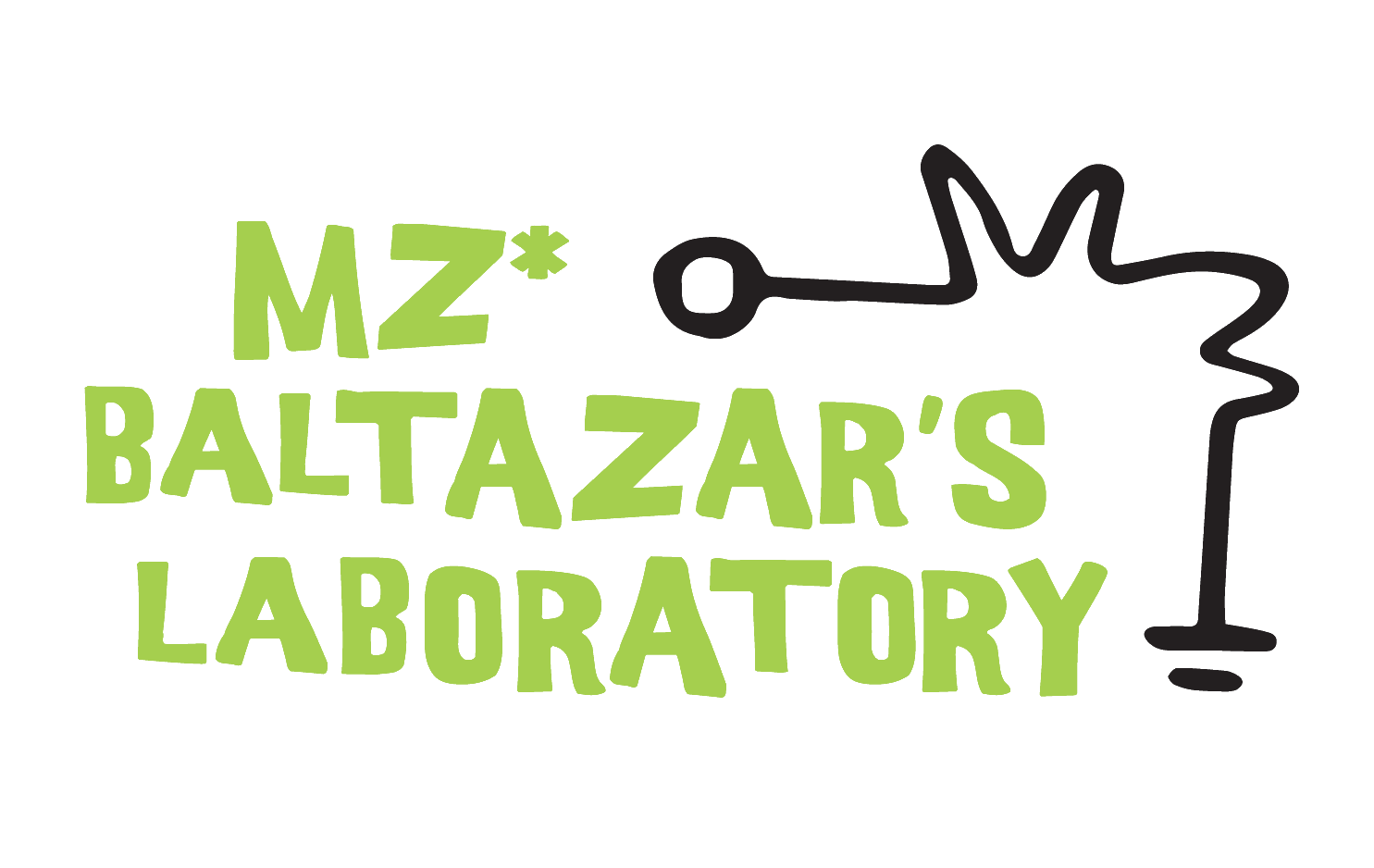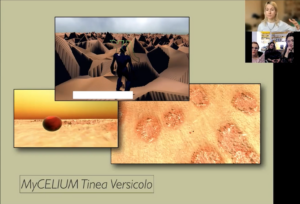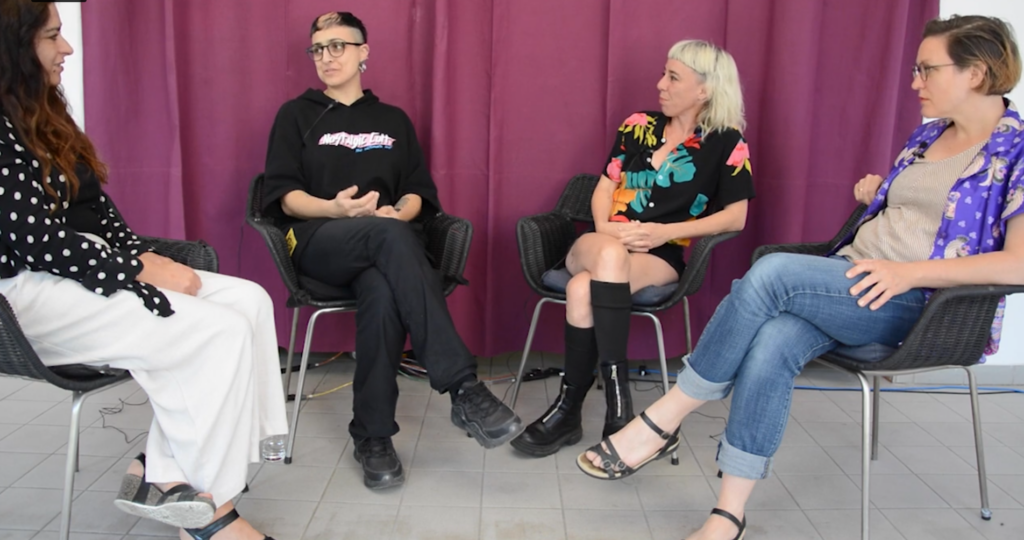SOS stands for Salon of Open Secrets*. Now what does that mean?
Salon of Open Secrets is a virtual reenactment of our cosy hackerspace studio/gallery, a place, a conversation, a happening and a relationship. Our Salon wants to reconnect to all of you out there making and creating, succeeding and failing to do things and to think with things, who manage to stay fascinated with the promise that technologies always held: to create a better and more liveable future for all. What are Open Secrets? The elephants in the room? Gossip? Publicly censored and stigmatised topics? Everything at the same time, but not exclusively. We define Open Secrets as very situated, niche and embodied experiences, know-hows and fun – of being female*, of bending binaries with/through/in art, technologies, engineering and materials science and of connecting in the most unexpected and life-assuring ways. *Format: we are holding an open online conversation with an artist, feminist, hacker, maker, and scientist on the existing challenges and their solutions – weaving an interconnected web of materials, components, ecologies, economies, labour, hardware, geographies, ethics and politics of becoming in our more than human world. The videos are published and then openly discussed via comments on the page.
Let’s start the discussion!
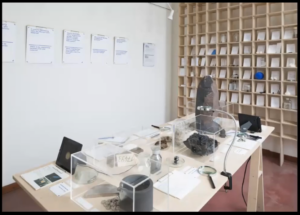
What is a piezo? How can we read it historically and with a feminist view? Mz*Baltazar’s talks to Lilo Viehweg about the interesting history and an artistic approach towards the materials.
Lilo Viehweg is a design researcher and lecturer. In her works, she investigates material-based design processes from a more-than-human perspective, the hierarchies of knowledge production and the related socio-political conditions of design. She teaches design anthropology and develops formats for interdisciplinary research. She is currently a PhD candidate in the make/sense programme at HGK Basel IXDM Critical Media Lab and the University of Arts Linz, a research associate at Bauhaus Dessau Foundation and a lecturer at the international Master’s programme COOP Design Research at the Anhalt University of Applied Sciences in cooperation with the Bauhaus Dessau Foundation and Humboldt University Berlin.
[Patrícia J. Reis, Taguhi Torosyan, Stefanie Wuschitz]
The conversation was recorded on xx at Mz* Baltazar’s Lab, Vienna, Austria
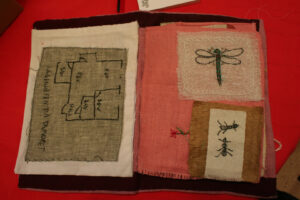
A mining town in the very north of Sweden, architecture, feminist and creative strategies and prolonged coloniality. We talk about feminist ecologies and mining from an architectural and community perspective and the complex relationship between margins and the centre in terms of material flows.
Karin Reisinger is a postdoctoral fellow at Critical Studies in Architecture, School of Architecture. She teaches Gender at the School of Architecture, Introduction to Urban Economics in the SUPD program, and methods of research in architecture at Vienna University of Technologies, Institute of Art and Design. During her postdoctoral fellowship, Karin was the key organiser of the conference Architecture and Feminisms: Ecologies, Economies, Technologies.
[Patrícia J. Reis, Taguhi Torosyan, Stefanie Wuschitz]
The conversation was recorded on xx at Mz* Baltazar’s Lab, Vienna, Austria
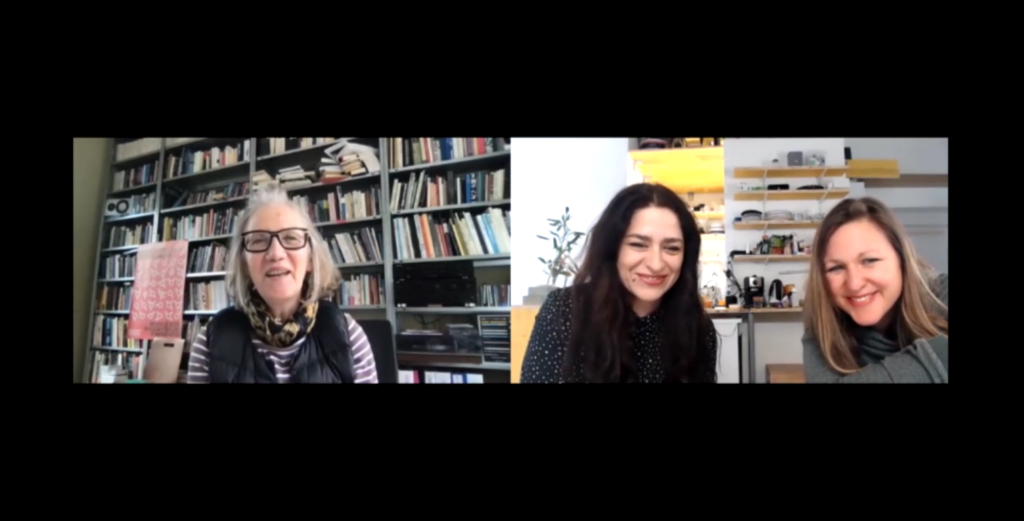
Cornelia Sollfrank in interview with Mz*Baltazar’s Laboratory about her ground-breaking work from Cyberfemenist until now in which we discuss the dynamics of collaboration, sharing of experience and knowledge, and autonomous infrastructures – structures spaces and platforms of visibility, opening up resources running on independent servers for common use, among other topics.
What challenges does the digital represent for traditional aesthetics, what new forms of authorship, and what definitions of artwork emerge in the condition of reworking, modification, distribution and sharing? How can we define digital aesthetics today?
How does creating artworks and collaborations play with those notions, and what is possible?
We also discuss Sollfrank’s research on net art, the work on OBN and Cyberfeminist International archives and the ontological difference between cyberfeminist and technofeminist phenomena and movements.
Cornelia Sollfrank is an artist, researcher and university lecturer who is based in Berlin. She studied Fine Art at the Munich Art Academy and the Hamburg University of the Arts and completed a PhD at the University of Dundee (UK). Recurring subjects in her artistic work in and about digital media and network culture are new forms of (political) organization, authorship and intellectual property, gender and techno-feminism. As a pioneer of Internet art, Cornelia Sollfrank built a reputation with three central projects: the net. art generator – a web-based art-producing ‘machine,’ Female Extension – her famous hack of the first competition for Internet art, and her activities related to Cyberfeminism – such as initiating and running the Old Boys Network (1997-2001). In her PhD “Performing the Paradoxes of Intellectual Property,” she investigated the increasingly conflicting relationship between art and copyright which led her to her current interest in digital commons and their aesthetics. Her most recent performance À la recherche de l’information perdue is about gender stereotypes in the digital underground. She is currently working at Zürich University of the Arts as an associate researcher in the project “Creating Commons.” Her projects and lectures have been presented internationally at museums, art festivals, universities and conferences.
[Patrícia J. Reis, Stefanie Wuschitz]
The conversation was recorded on 12th May 2021 at Mz* Baltazar’s Lab, Vienna, Austria
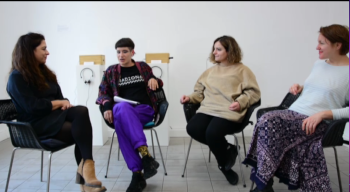
Paula Pin talks to Mz*Baltazar’s Laboratory about her pioneer work in the field of transfeminism*biohacking in which we talk about ‘building’ science fiction and hacking everything – incorporating technologies with bodies and biology, what Paula Pin terms as ‘expanded body.’
Paula Pin is a researcher, artist, and activist, who has a strong inclination toward experimental processes with collective and free technologies. Her work spans from drawing to abstract video, from circuit bending to performance and lab experiments, always located at the intersection where biology, science, and queer art collide. She has participated in the independent trans-hack-feminist laboratories Pechblenda and Transnoise and has collaborated in the extensive bio-hacking network, Hackteria, since 2012. Her practical experience in bio-hacking (body/environment) and health in the Pechblenda laboratory gave way to Biotranslab, an autonomous lab on wheels for experiments and investigations on Open Science Friction and queer natures on the road. The lab is set inside a bus, the CyanoVan. The lab is now on wheels running participatory workshops and promoting biohacking as a critical site for knowledge production and collaborative queering of the status quo. She has been a resident artist at institutions such as Université Pierre et Marie Curie, Paris; School of Arts (KASK), Ghent; Hangar, Barcelona; and Gaité Lyrique Paris, and has participated in Quirky Ecologies at Click Festival, Denmark and OSH Open Source Gathering, Shenzhen, China between others.
http://paulapin.net
[Patrícia J. Reis, Taguhi Torosyan, Stefanie Wuschitz]
The conversation was recorded on 27th October 2021 at Mz* Baltazar’s Lab, Vienna, Austria
Janne Kummer talks with Mz* Baltazar’s about her hacking practice in embodied interfaces.
We discuss how and which bodies are represented and what that representation does to our bodies – both digital and analogue. What are the inscriptions of living in a neoliberal system as a female-read body?
Janne Nora Kummer is a director, performer and multimedia artist, based in Berlin. In their work, they deal with the connection of new media and performance art and the effects of technology and the Internet on the individual and society. They teach and research within the Master Degree Program Spiel && Objekt at the HfS Ernst Busch. In their research, she is critically dealing with body images and power relations, based on gender identities and their (re) production in the analogue and digital world. In addition, they work on a contemporary artistic practice to utilise the subversive and creative potential of new technologies. Their focus lies on the development of alternative narratives and narrative formats that address the complexity of a technological, digitalised and globalised world and that operate beyond the structures of established power mechanisms. They are an alumna of the Studienstiftung des Deutschen Volkes and a permanent member of virtuellestheater.
https://www.jannenorakummer.de
[Patrícia J. Reis, Taguhi Torosyan, Stefanie Wuschitz]
The conversation was recorded on 17th December 2021 at Mz* Baltazar’s Lab, Vienna, Austria
Gaia Leandra and Ce Quimera in conversation with Mz* Baltazar’s Lab about their transfeminist hacking research and practice.
We discuss the individual and collective definitions of transhack feminism. We talk about two distinctive but intertwined approaches – that of hacking the sex, gender, sexuality, bodies and identities, bacteria and hacking as the practice of transdisciplinarity and horizontal learning. In both cases the questions of mutual care and building safer spaces for individuals with different sensibilities are important. Hence, the praxis of feminism is central to this particular fusion of art and science.
[Patrícia J. Reis, Stefanie Wuschitz]
The conversation was recorded on 1st June 2022 in Vienna during the exhibition Louisa Speaks: Intimate Dialogues On Language, Technology And Biohacking By Giulia Tomasello Curated By Arianna Forte at Mz* Baltazar’s Lab, Vienna, Austria
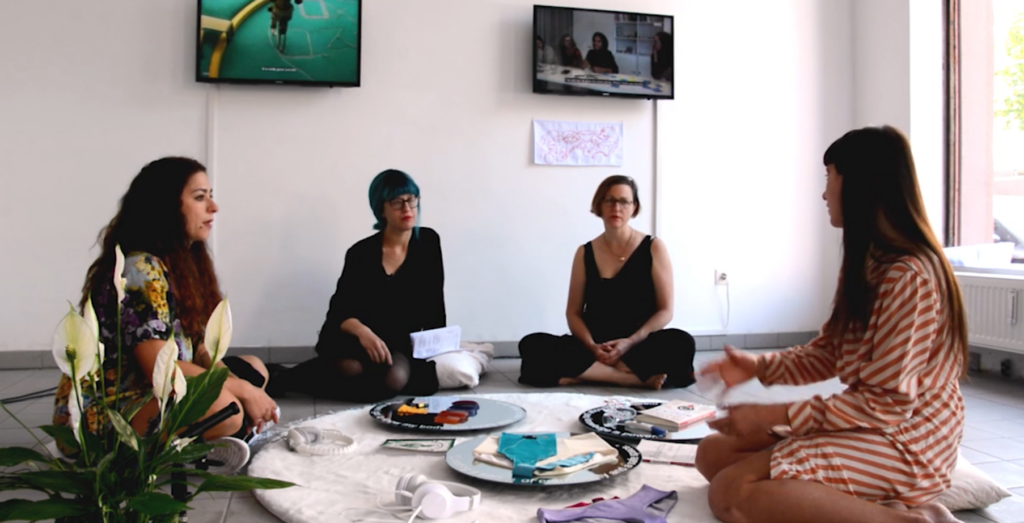
We discuss speculative fiction breaking the taboos, stigmas and the culture of shaming around female bodies, We discuss methods of building self-empowerment and knowledge about intimacy through art, science and technologies.
Giulia Tomasello is an artist and a designer committed to female intimate care and its innovation, combining biohacking and interactive wearables. Winner of Re-FREAM, STARTS Prize and WORTH Partnership, awarded from EU Horizon 2020, for her projects Alma, Future Flora and Rethinking the Bra. Recently recognised for her multidisciplinary work with the Japanese Award World Omosiroi. Giulia offers new deeper knowledge of females’ well-being, developing innovative tools in the intersection between medical and social sciences. She is currently part of the Vision Health Pioneers incubator in Berlin, where she is developing Alma. Alma co-creates tools for a cultural change in female intimate care by combining technology and education. Coded Bodies is her teaching platform designed to learn the basics of soft wearables and the exploration of biological textiles. Tomasello is currently a Visiting Lecturer in soft technology at the Royal College of Arts in London and Politecnico in Milano.
Arianna Forte is an independent curator and organizer of artistic programs based in Rome. She is moving freely between official cultural institutions, non-profit organizations, squats and independent spaces. She has been part of international events teams such as the Transmediale – festival for art and digital culture in Berlin and the research centre HER She loves Data. She recently curated the first edition of 1MetroSotto la Metro, a temporary exhibition of interactive media art that took place in the metro stations of Rome. Her research concerns how artistic practices deal with technologies and create new opportunities for social imagination and activism. At the moment, she is focused on how technological infrastructures are linked to gender issues, biases and taboos related to femininity. Indeed she has just set up the ERINNI association, which deals with curatorial practices and gender politics in the field of media art.
[Patrícia J. Reis, Stefanie Wuschitz]
The conversation was recorded on 31st May 2022 in Vienna during the exhibition Louisa Speaks: Intimate Dialogues On Language, Technology And Biohacking By Giulia Tomasello Curated By Arianna Forte at Mz* Baltazar’s Lab, Vienna, Austria
